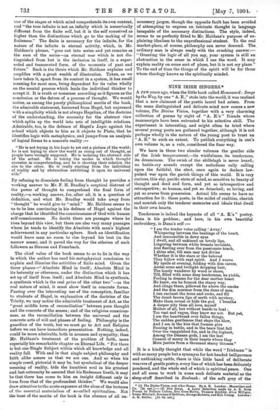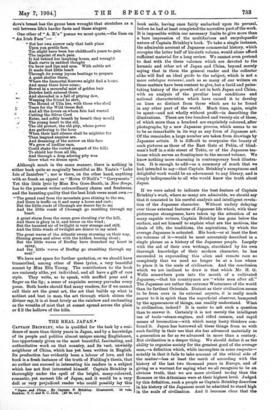NINE IRISH SINGERS.*
A FEW years ago, when the little book called Homeward : Songs
by the Way, by one " A. E.," stole into the world, it was realised that a new claimant of the poetic laurel had arisen. From the same distinguished and delicate mind now comes a new volume, The Divine Vision, together with a very charming collection of poems by eight of " A. E.'s " friends whose manuscripts have been entrusted to his selective skill. The experiment is interesting, and might often be tried where several young poets are gathered together, although it is not perhaps wholly in the nature of the young poet to trust an " A. E." to such an extent. To publish everything in one's own volume is, as a rule, considered the finer way.
We have in these two slender volumes the gentler side of the Irish temperament,—its wistfulness, its tenderness, its dreaminess. The swish of the shillelagh is never heard; no battle-cry sounds except the melodious rally calling upon the faithful, the elect, once again to declare low- pulsed war upon the garish things of this world. It is very curious, this shy, pacific state of mind, so sensitive to beauty of thought and deed and form, and yet so introspective and retrospective ; so human, and yet so detached; so loving, and yet so averse from possession. Actual life seems to have no attraction for it : these poets, in the midst of realities, cherish and nourish only the tenderer memories and ideals that dwell in their own hearts.
Tenderness is indeed the keynote of all " A. E.'s " poetry. Dana is his goddess; and here, in his own beautiful embroidery, is Dana's self :—
" I am the tender voice calling Away,'
Whispering between the beatings of the heart, And inaccessible in dewy eyes I dwell, and all unkissed on lovely lips, Lingering between white breasts inviolate, And fleeting ever from the passionate touch, I shine afar, till men may not divine Whether it is the stars or the beloved They follow with rapt spirit. And I weave My spells at evening, folding with dim caress, Aerial arms and twilight dropping hair, The lonely wanderer by wood or shore, Till, filled with some deep tenderness, he yields, Feeling in dreams for the dear mother heart He knew, ere he forsook the starry way, And clings there, pillowed far above the smoke And the dim murmur from the duns of men.
I can enchant the trees and rocks, and fill The dumb brown lips of earth with mystery, Make them reveal or hide the god. I breathe A deeper pity than all love, myself Mother of all, but without hands to heal :
Too vast and vague, they know me not. But yet,
I am the heartbreak over fallen things, The sudden gentleness that stays the blow, And I am in the kiss that foemen give Pausing in battle, and in the tears that fall Over the vanquished foe, and in the highest, Among the Daman gods, I am the last Council of mercy in their hearts where they
Mete justice from a thousand starry thrones."
It is a kindly thought that while the word " Irishman " is with so many people but a synonym for hot-headed belligerence and unthinking rattle, there is this little band of deliberate weavers of gentle poetry, every line of which has been delicately pondered, and the whole end of which is spiritual peace. One and all seem to work in some such delicate material as the sleep-stuff described in Realmah : of the soft grey of the
• (1) The Divine Vision, and other Poems. By A. E. London Macmillan and Co. Os. net.l—(2) Nem Songs. A Lyric Selection made by, A. E. from
Poems by Ps m l ic Colum, Eva Gore-Booth, Thomas Keohler. Alice Milligan,
Susan Mitchell, Seumas O'Sullivan, George Roberts, and Ella Young. Locdou
A. H. Bulleu. Gd. net.]
One other of "A. E.'s" poems we must quote,—the lines on " An Irish Face ":—
"Not her own sorrow only that bath place Upon you gentle face.
Too slight have been her childhood's years to gain
The imprint of such pain. It hid behind her laughing hours, and wrought Each curve in saddest thought On brow and lips and eyes. With subtle art It made that little heart Through its young joyous beatings to prepare A quiet shelter there, Where the Immortal. Sorrows might find a lwmo.
And many there have come ; Bowed in a mournful mist of golden hair Deirdre bath entered there.
And shrouded in a fall of pitying dew, Weeping the friend he slew, The Hound of Ulla lies, with those who shod ••• • Tears for the Wild Geese fled.
And all the lovers on whom fate had warred Cutting the Silver Cord Enter, and softly breath by breath they mould The young heart to the old, The old protest, the old pity, whose power Are gathering to the hour When their knit silence shall be mightier far Than leagued empires are. And dreaming of the sorrow on this face We grow of lordlier race, Could shake the rooted rampart of the hilly To shield her from all ills, And through a deep adoring pity won Grow what we dream upon."
Although much in the same manner, there is nothing in either book quite so magically beautiful as Mr. Yeats's "Lake Isle of Innisfree" ; nor is there, on the other hand, anything with so frank an appeal as " Moira O'Neill's " " Corrymeela." Yet this little lyric by Miss Eva Gore-Booth, in New Songs, has to the present writer extraordinary charm and freshness, and the haunting quality that the best Irish verse must own :— " The grand road from the mountain goes shining to the sea, And there is traffic on it and many a horse and cart ; But the little roads of Cloonagh are dearer far to me And the little roads of Cloonagh go rambling through my
heart.
A great storm from the ocean goes shouting o'er the hill, And there is glory in it, and terror on the wind; But the haunted air of twilight is very strange and still, And the little winds of twilight are dearer to my mind.
The great waves of the Atlantic sweep storming on their way, Shining green and silver with the hidden herring shoal ; But the little waves of Breffny have drenched my heart in spray, And the little waves of Breffny go stumbling through my soul."
We have not space for further quotation, or we should have transcribed, among other of these lyrics, a very beautiful sonnet by Miss Ella Young. The contributors to the book are curiously alike, yet individual, and all have a gift of rare style. They write, so to speak, with muffled pens and a finger on the lip ; a sense of exquisite secrecy pervades every poem. Both books should find many readers, for if we cannot call their art the great art, the art that builds up what is noblest and best in man, the art through which shines the diviner ray, it is at least lovely as the rainbow and enchanting as the wreaths of mist that at sunset spread across the plain
or fill the hollows of the hills.











































 Previous page
Previous page